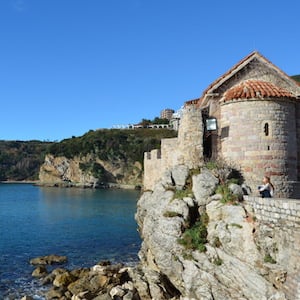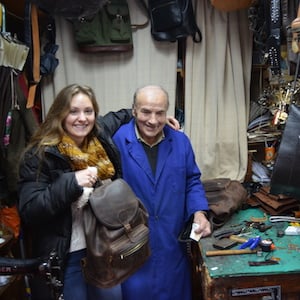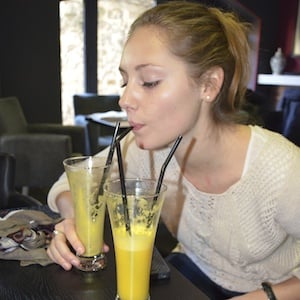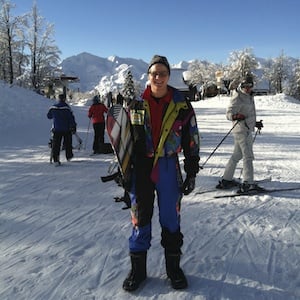Alexander & Jamie
It was 4:00 a.m. on Thursday, Dec. 19th. We had spent the entire night packing the last of our things, and watching the snow turn into sleet. We were so excited for our first adventure as a married couple, and even more excited for a break from school. Exhausted from finals week, we each gulped a lemonade Rockstar, loaded the car with our luggage, and left for the airport.
Driving to the Salt Lake City Airport through the icy rain and snow slowed us down, but all I could think about was stepping off the plane in Ljubljana, Slovenia in less than 24 hours. The Balkan countries—Slovenia, Croatia, Serbia and Bosnia—had been my home for ten months, and Alex’s for more than two years. We both graduated from Davis High School in 2010, but only knew each other as acquaintances. In 2011 I moved to Rome to be a nanny, and then to Zagreb, Croatia for the same reason; Alex served as a missionary for our church in Serbia, and then Bosnia and Croatia. I returned to Utah in July of 2012, and Alex the following year in February. On the basis of mutual experience, we started dating and married in November of 2013.
We developed a great love for the Balkan people we served and lived among, and the first thing we wanted to do was return to spend the holidays with them! We wanted to keep alive those friendships we cherish so dearly. Traveling had also become important to us, as we had discovered new people and places in the past few years. To “travel more” had become one of our greatest lifetime goals.
When we arrived at the Salt Lake City Airport around 5:30 a.m., the sleet was a thick, icy blizzard, and the roads were unmanageable. We barely made it on time. Our punctuality made little difference, however, because our flight was eventually cancelled. Over 200 flights were cancelled and 100 delayed that morning. You never think those kinds of things will happen to you—only to those “other people” on the news.
We spent twelve more hours in the airport trying to secure a different flight out of Utah. While Alex meandered through lines of upset travelers, I typed up a 15-page paper that was due in 24 hours—my punishment for skipping out on the latter part of finals week. As I sat there, zoning out, I remembered something I learned while working in Italy: It’s not where you are, or what you’re doing, but whom you’re with. It didn’t matter that we were sitting in the airport, surrounded by familiar territory and concrete beams, or even that we were exhausted and hungry. It put a smile on my face to know I was with Alex, and that this was part of our adventure.
Our new flight to Charles de Gaulle Airport left around 8:30 p.m., and we landed in Paris 10 hours later. A connection flight landed us in Slovenia around 11:00 p.m., CET, and from there we drove to Zagreb. As exhausted as we were, it was so good to get out the next morning and see the city. Off the main square in Zagreb is a dolac, or open market. Fresh vegetables, fish, fruit and trinkets are sold there. Down the steps from the dolac is a fresh flower market, and shadowing the tables of produce and bustling shoppers is a beautiful cathedral with delicate ivory spires and Catholic insignia.
Aside from all the historical architecture, rich culture and beautiful people is our true love: food. We’re all about the epicurean experience. Italy has a strong influence on Croatian cuisine, so Alex and I got to work sampling their breads, gelatos and cheeses. We spent five days in Croatia going to lunch with friends and enjoying the chilly weather—perfect for bundling up and holding hands as we walked through cobblestone streets. One day we woke up early to walk through the morning mist to my favorite park, Maksimir. The trees tower and the paths are innumerable. I felt like we had gone back in time to the 1800s—the swans were seemingly suspended on the lakes, and the fog enveloped them as they swam further away from us.
We left what was familiar in Zagreb, rented a car, and drove straight to Sarajevo, Bosnia. Many people say it’s a mini version of Istanbul, but Sarajevo has its own vibe. Mountains surround the Olympic city, and pine trees cover the old hiding places of Serbian snipers. Sarajevo has beautifully recovered from the repercussions of Yugoslavia’s split, but there’s still a subtle sorrow that settles in the faces of war victims. Small, elongated cemeteries are sandwiched between apartments and small communities, stretching upward like fingers trying to claw their way out of Sarajevo’s valley. Despite its history, the city has succeeded in establishing for itself an overall feeling of excitement and movement. We sampled desserts and drinks from the small clubs in the city’s main market, and then crashed at a small hostel off the main square. Our room was dirt cheap, and the unmatched, warm hospitality was characteristic of Muslim culture. The exquisite mosques were fully lighted and visible from our room. It was perfect.
The next morning we packed the car, satisfied and ready for a new experience. We drove through the day on a one-lane, dirt road with a sheer drop off on one side. We had until 10 p.m. that night to check into our hostel in Budva, Montenegro. Caution gave way to punctuality as we cruised through awkward passes and over wooden bridges to make our deadline. Suspicious, Montenegrin border patrolmen ate up the last of our daylight, so the rest of our drive through the famed Pivsko Jezero (literally translated, Beer Lake) was spent in darkness. I thought about all the pictures I had seen of this place—how clear and bright they were—but I was so grateful to have seen it in this unique way, with the moonlight and the fog hitting the lake’s surface. We were in Who-Knows-Where, Montenegro, and it was surreal. We pulled over and just watched as the moon took its last breath of light and was swallowed by clouds.
We arrived in Budva on time, and were greeted with only the warmest welcome. Our host asked us what time we were waking up, and offered us breakfast in bed. Yes ma’am. The next morning we woke up at 8:00 a.m. to a knock at our door and warm scone waffles with meats, cheeses and mint tea. We pulled back the curtain to see blue skies and the sun on PALM TREES. We had expedited a whole season in one day! Hello, Budva.
We walked to the small fortress and beach on the coast, and lay in the sand and sunshine for an hour. True to European culture, the Montenegrins slowly trickled down to the beach and enjoyed a cup of coffee with friends and family. The feeling in Budva was opposite the feeling in Sarajevo. It felt like Budva sat us down and started rubbing our shoulders. Just relax…
So we did. We went to a café that was hidden in the fortress’ maze of walls and ordered two tall glasses of fresh-squeezed orange juice. Outside the window I watched beautiful, aged women scoop oranges from the grass and gently place them in baskets. Best orange juice I’ve ever had. And who knows where those oranges came from, or if they were clean. I drank Alex’s, too.
We had to pry ourselves from the private beach we discovered beyond the fortress. No one was there but two men in speedos, collecting glass bottles and perfectly rounded stones. The salty smell of the sand, the sound of the soft waves and the citrus taste in the back of my mouth gave me a moment of intense gratitude for the experience—gratitude that we chose this over stainless steel soap holders and matching towels.
Brief stops in Dubrovnik, Zadar and Zagreb landed us in Bohinj, Slovenia on New Year’s Eve. We spent the night in a lodge-style hotel, swimming and watching movies. We crashed before the fireworks even began, exhausted in the best way.
The next morning, we saw the small town of Bohinj in daylight for the first time. Quaint describes it perfectly. Small plaster and wooden houses pumped smoke from their chimneys while rustic life sauntered below the gray veil of clouds and green Julian Alps. We followed a road that traces the shoreline of Lake Bohinj, and ended up at Vogel Mountain Ski Resort. There wasn’t a single snowflake on the ground, but the gondola was still running, and people were lined up with skis and passes.
We decided to take a chance and buy a couple of ski passes for the day. They packed us into the gondola—boots, skis, snowboards, gear and all—like cattle, and we were slowly pulled up higher and higher. Lake Bohinj was visible through the fogged glass, and the Alps looked greener than they did that morning. The higher we went the more beautiful was the view. The gray veil of clouds swallowed up our cable car, and everyone went silent—put away their iPhones. We were just getting our breath back when the gondola emerged from the fog. Everyone audibly gasped and pulled out their iPhones again. It was incredible. Nothing but clear skies. The most intense blue sky I’ve ever seen. There wasn’t a single cloud. The only things you could see on the horizon—for miles and miles—were snowcapped mountain tips and a floor of fog. I don’t hesitate to say it’s the most beautiful place I’ve ever seen, and neither does my husband. It was a perfect ski day, and we had perpetual smiles. We ate in an old lodge on the resort—massive, old-fashioned ceramic furnaces kept us warm while we devoured fresh pizza and thick hot chocolate. I mean that literally: it was hot, melted chocolate with whipped cream. We fought the food coma and spent four more hours skiing and enjoying long talks on the ski lifts. It was magical. This is the kind of stuff we’re going to tell our kids, I thought.
We lumbered sorely back down the lift around 5:00 p.m. and went to a nearby “Aqua Park” to enjoy their hot tubs and steam rooms. We slept like bears that night and left the next morning for Beograd, Serbia.
Alex was able to reconnect with all the people he loved and served, and I was able to get a better picture of his old stomping grounds. We stopped at different bakeries and ordered more pastries and cheesy breads than either of us could handle. We brought an extra bag to share with friends we met, and then drove to the airport outside of Beograd. Security was non-existent and we were first in line to board. We flew into Istanbul—a one-hour flight—and bought a visa for only $15.00.
For only €20.00 a night we stayed at a small, local-owned hotel in the historical part of Istanbul. Breakfast was served each morning, and the owner was the most hospitable of all our hosts. We were greeted each time we returned with apple tea and light conversation. He made suggestions and arranged for shuttles to pick us up and take us to the airport. We were a short walk from Hagia Sophia and the Blue Mosque. It was incredible. Istanbul has one of the world’s richest national histories, and we were walking through some of its greatest monuments. We stumbled upon the Grand Bazaar, being sure to stop and buy a cup of juice from every stand that offered one. Piles of fresh oranges and pomegranates were squeezed into flimsy plastic cups—we both drank five.
Somehow we managed to find our way out of the bazaar, and ended up on Istanbul’s coastal front. We took a transcontinental ferry through the strait that connects the Sea of Marmara and the Black Sea, and then walked tiredly back to our hotel. Our host arranged for a shuttle to pick us up and take us to get a famed Turkish bath.
If you’ve never had a Turkish bath, then I recommend you move that up on your “List of Things To Do Before I Die.” In an underground, mosque-like structure, they separate men and women into different rooms, and they ask you to strip down into a bikini or swimsuit. (No one told us that was an option, so we went with Option B) Naked). We were each lead to a steam room where you sweat out all the toxins in your skin. Then they wash you with cold water and have you lay down on a hot marble slab in the center of the room. Three other people are on each side of the square slab, so for those who are shy around skin, I’d recommend an alcohol-related remedy.
The woman who scrubbed my skin was a voluptuous Turkish native with a boisterous laugh and an unruly mustache. Turns out my husband’s Hammam expert looked the exact same, except he wasn’t wearing a top. What I’m saying is these people won’t judge you if you don’t judge them. Be nice and they’ll scrub you extra long and hard. When they say, “Good massage?!” you must emphatically nod your head, yes! I even got a hug at the end of my massage—a big, wet, naked hug. And I was grateful. She had stretched and relaxed every tense muscle in my body, and I had an experience I could talk about for years. I dressed quickly so I could hear my husband’s experience. Again, it was similar. We left smiling.
We were sad to leave Turkey but excited for our final destination: Banja Luka, Bosnia. Both of us had spent time with the people here, and loved every inch of the small city and rural land. We spent Serbian Orthodox Christmas—Jan. 7th—driving from the airport outside of Beograde to Banja Luka. We arrived just in time for the traditional Christmas dinner and rituals, and enjoyed the evening with one of our favorite families. Before we left the next day, we took a walk up to the Banj Brdo Monument and looked out over the city. It was the perfect way to end our trip. It was a peaceful day, and the sun was setting behind us. We spent the drive back to Zagreb in serene silence, thinking about the great experiences our family and friends had afforded us.
Alex and I missed the first week of the semester in order to stay longer on our honeymoon. It was worth it. I’ve missed entire semesters of school to travel. It’s worth it. We’ve opted out of having thicker towel sets and matching dishes so we can travel. It’s worth it. When Alex found Traveler’s Joy, it became our registry without discussion. There were a lot of people who told us we were silly to turn down “gifts that would help us build and start our life together", but they were referring to vacuums, silverware sets, and crockpots. Material goods won’t bring a couple together. In fact, a lot of the time it can have the opposite effect. Yeah, Alex and I are sleeping on a mattress without a bed frame, and we picked up our drawers from the nearby thrift store. But our walls are filled with pictures of the places and people that will have a longer, lasting effect on our relationship than any set of pans ever could.
We’re grateful to the friends and family who get it. We’re grateful to Traveler’s Joy—because they get it.








